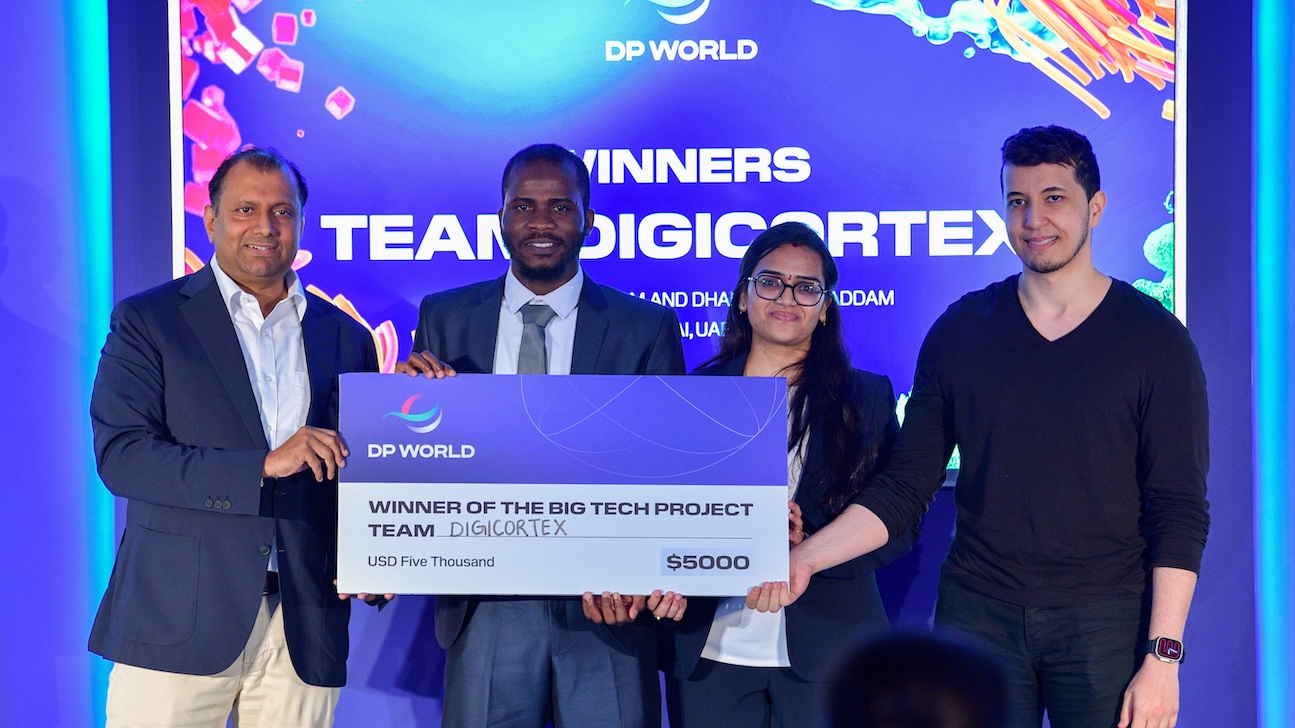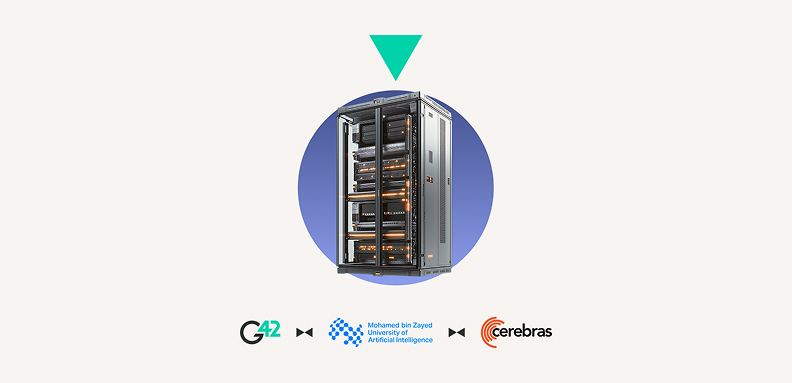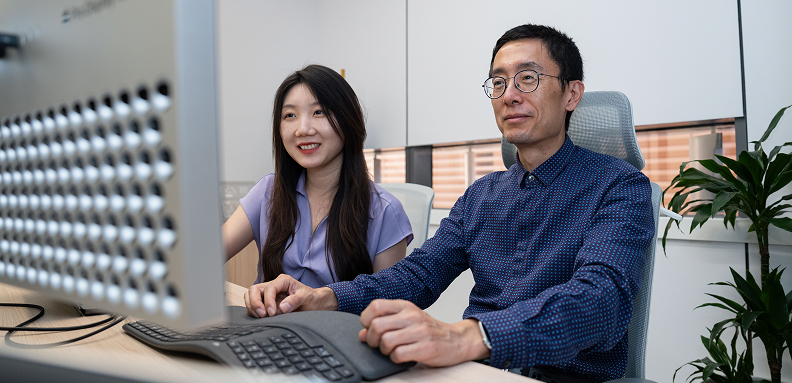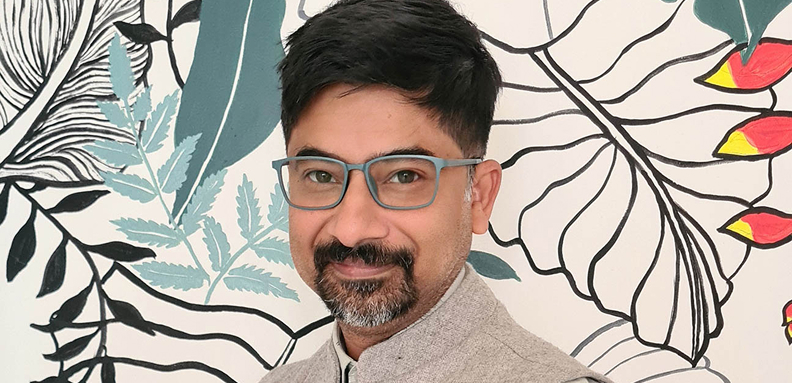Exploring metaverse solutions for seamless logistics
Class of 2022 graduates claim DP World’s Big Tech Project
Monday, December 12, 2022
Every industry and business in the world has challenges to solve and AI is a likely answer. Two graduates in Mohamed bin Zayed University of Artificial Intelligence’s (MBZUAI) Class of 2022 are ready to make their impact by creating bespoke solutions. The pair are among 52 next generation talents providing a much-needed boost to the global shortage of AI practitioners.Dhanalaxmi Gaddam, a machine learning student from India, and Abbas Bamidele Abdulsalam, a computer vision student from Nigeria, are the first winners of DP World’s Big Tech Project – an international competition challenging students from leading universities in the United Arab Emirates and India to solve trade challenges across the globe through the power of the metaverse.
The pair formed Team Digicortex and created a two-in-one metaverse-based solution to claim the top prize this month. It caps off a big two years for the future innovators who will receive their master’s degrees from MBZUAI on January 30, 2023 and commence their prize of a paid internship with the Emirati multinational logistics company, DP World.
The impact their work can have — in this instance on the metaverse — remains largely untapped. Last week, a study from Strategy& showed that the metaverse is projected to contribute about $15 billion (USD) to GCC economies annually by 2030. The National reported that this would be led by Saudi Arabia and the UAE (the latter set to gain $3.3 billion or 22%), as governments continue to introduce measures to tap into the potential of the emerging technology.
Alongside the MBZUAI team, there were also three strong solutions presented by two top universities from India – the International Institute of Information Technology (IIIT) Bangalore and the Indian Institute of Technology Kharagpur.
Two parts to a winning solution
Abdulsalam said the first idea they pitched was flawed. “We didn’t actually know what they do,” he explains. “DP World is a logistics company that deals with cargo handling and international trade, and is responsible for 10% of the global trade, so it’s a huge company. Once they held a webinar to explain their business model and challenges, we refined our idea again and again before pitching our third idea which ultimately came out on top.”
Having written his thesis on adversarial attacks on vision transformers (ViTs), Abdulsalam recognized that the metaverse is different. “It’s kind of a completely different research domain; mine deals with exploring the limitations of machine learning and computer vision models,” he explains. “Metaverse is different, but whoever has knowledge of computer vision or machine learning or AI in general can identify the commonalities. MBZUAI taught me how to apply what I have learnt in a real-world situation.”
Abdulsalam described the winning solution as two ideas in one — using the metaverse, virtual and augmented reality technologies to enhance training and productivity at DP World’s ports and terminals. The first solution is a virtual training simulator for new employees to gain near real-life experience with port equipment without having to physically visit the terminals.
“It focused on how to operate port terminal equipment by giving the employee the feeling of being physically present, for example, lifting a shipping containing from one location and dropping it in another location using a gantry crane,” he said. “DP World operates more than 70 inland and marine terminals, and this metaverse-based training solution could help new employees have access to training 24/7.”
[wps_instapost code=”https://www.instagram.com/p/Cl1Ee_zJVON/?utm_source=ig_embed&utm_campaign=loading”]
The second solution uses Google Glass to enhance efficiency and maintenance at ports and terminals by providing easy-to-access instructions and tutorials on the spot. Technicians can also troubleshoot and perform maintenance with remote experts. Together, the solutions will reduce the risk of accidents by facilitating virtual inductions and increase efficiency by streamlining operations.
“We deployed on an augmented reality lens where staff could use these glasses for easily accessing maintenance guides, and receiving daily routine check reminders on the job,” Gaddam explains. “They enable the technicians to use a hands-free system by accessing a step-by-step maintenance guide on a screen overlayed in front of them. We used it mainly for inspections, however, in time it could have more functionality where the application could be managed through a web app.”
From academic conferences to internships
Abdulsalam, who interned at Inception Institute of Artificial Intelligence (IIAI), said he can’t wait to enter industry and start making an impact. “Learning never ends but I feel if I start working, I can start making an impact and give different perspectives. It is very promising that companies like DP World are focused on using the metaverse for solutions to their challenges and our experience has given us a feel for what working with the company would be like.” Abdulsalam is the first in his family to achieve a master’s degree.Both have been granted a Golden Visa from the Abu Dhabi Residents Office (ADRO), and plan to look for further opportunities in the UAE after they complete their paid internship.
[wps_in-the-media title=”In the media” first-item-date-=”November 29, 2022″ first-item-title=”Dubai’s DP World to get cracking with staff training on Metaverse” first-item-link=”https://gulfnews.com/business/markets/dubais-dp-world-to-get-cracking-with-staff-training-on-metaverse-1.92349446″ first-item-source=”Gulf News” second-item-date-=”November 29, 2022″ second-item-title=”Emirati University Wins DP World’s Inaugural Big Tech Project Contest” second-item-link=”https://www.transportandlogisticsme.com/smart-technology-innovation/emirati-university-wins-dp-worlds-inaugural-big-tech-project-contest” second-item-source=”Transport & Logistics Middle East” third-item-date-=”November 30, 2022″ third-item-title=”Emirati university wins DP World’s inaugural Big Tech Project competition” third-item-link=”https://www.zawya.com/en/press-release/companies-news/emirati-university-wins-dp-worlds-inaugural-big-tech-project-competition-ii9r2ap8″ third-item-source=”Zawya”][/wps_in-the-media]
Committed to the metaverse and the UAE’s AI Strategy
MBZUAI’s new Metaverse Lab directed by Associate Professor of Computer Vision, Hao Li, is the university’s second research center and will focus on integrating computer vision, graphics, and machine learning. The lab will develop next-generation AI algorithms to create photorealistic virtual humans, digitize dynamic environments, and create 2D and spatial content.
Sultan Al Hajji, Vice President of Public Affairs and Alumni Relations at MBZUAI, said: “We are thrilled to see two of our students developing such an innovative solution, which could have a positive impact for DP World and its customers, as well as the wider industry.
“At MBZUAI, we are dedicated to advancing AI as a global force for humanity. By building the AI future leaders and fostering an innovation ecosystem, we act as a strategic think tank for the public and private sectors. As such, we aim to develop future solutions that will impact the world and change the way we imagine things. The Big Tech Project is a tangible example of that work in practice, and we would like to thank DP World for hosting such a forward-thinking competition that gave our students a chance to develop real-life industry solutions.”
DP World’s Chief Technology Officer, Pradeep Desai, who was part of the Big Tech Project judging panel, shared his take on the metaverse and the company’s commitment to digitization.
“The metaverse is still in its infancy so it is hard to predict exactly how it might be utilized in our industry in the future,” he stated. “But the ideas these inspiring students put forward have the potential to change the face of global trade. They came up with solutions and put together prototypes in less than eight weeks, which is very rare for these kinds of challenges. We believe that technology will make trade more resilient by infusing flexibility, resilience, and transparency into the logistics ecosystem.”
- metaverse ,
- students ,
- commencement 2022 ,
- hao li ,
Related
UAE to deploy 8 exaflop supercomputer in India to strengthen local sovereign AI infrastructure
MBZUAI will partner with G42, Cerebras, and India’s Centre for Development of Advanced Computing to deliver the.....
- supercomputer ,
- sovereign ,
- collaboration ,
- summit ,
- partnership ,
Not just another deck: how MBZUAI’s okkslides is redefining executive communication
The MBZUAI startup is turning messy research and organizational context into decision-ready narratives with a human-in-the-loop AI.....
Read MoreMBZUAI report on AI for the global south launches at India AI Impact Summit
The report identifies 12 critical research questions to guide the next decade of inclusive and equitable AI.....
- Report ,
- equitable ,
- global south ,
- AI4GS ,
- social impact ,
- inclusion ,
- summit ,


